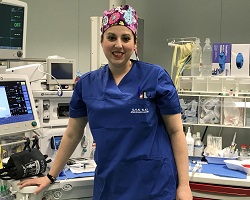Chief Nurse of Anaesthesiology Department Maria Kapritsou – improving cancer patients’ experience

Maria Kapritsou
“In the thirteen years I have worked as a nurse, I have witnessed a lot. I have learned that a relationship with a patient can be formed by simply making eye contact. I have seen many battles against cancer being fought and rejoiced at the greatest wins. I have also cried with my patients and comforted families who experienced a terrible loss,” says Maria Kapritsou, Chief Nurse of the Anaesthesiology Department of the Day Care Surgery Clinic “N. Kourkoulos”, “Saint Savvas” Hospital in Athens, Greece.
“This job is not one we leave at our desk at the end of our shift - when we go home, we carry our patients’ worries, fears and stories with us,” she adds.
38-year-old Maria and her small but tight-knit team of 5 nurses are responsible for the safety and well-being of an average of 16 cancer patients a day.
Creating a bond with patients is a skill
“We are responsible for monitoring the patients’ vital signs during surgery and we ensure the patients’ safety by evaluating their condition in the post-operative care unit,” says Maria. “An important aspect, which I have also researched during my PhD and post-doctoral programmes, is the element of patients’ stress levels. To achieve better clinical outcomes and an improved recovery, it is essential for patients to be pain-free and to feel safe and taken care of when hospitalized.”
“As nurses, we create a special bond with our patients. Our work goes beyond administering drugs and caring for patients’ physical well-being. We also support them psychologically and emotionally,” explains Maria.
“When I am having a bad day, I think of the patient who told me that my smile reassured him as he entered the operating room. His words remind me of the impact we nurses have.
“My former head nurse, who is my mentor, taught me how to stand by patients, how to support them. You can always open a book and learn how to administer a medicine but understanding how to be close to a patient is a skill you gain over time.
My team is my strength
“To stay motivated, I rely on my team. We support one another and can face any difficulty together, like a family.
“That is also why I dedicate as much time as possible to mentoring my colleagues. It is important that they know they can always turn to me for anything – to talk about their ambitions, their fears and their experiences with patients. We are only as strong as we are united, and we can only succeed as a team if we guide one another in our efforts.
Research and learning for better patient experience
“My priority is to improve my patients’ experiences through continued learning, which is why I pursued two master’s degrees, a PhD and a post-doctoral programme. I also encourage my colleagues to further their education, to remain informed on new trends by attending nursing conferences, and to participate in clinical trials.
“I believe that we nurses need to speak in a unified, strong voice on promoting evidence-based practice for patient well-being.
“As Vice Chair of the International Collaboration for PeriAnaesthesia Nurses, I cultivate contacts with nurses in different countries and tell my colleagues about what I learn. I value this opportunity greatly, as sharing knowledge means strengthening the nursing profession worldwide.
"Nurses in Greece are increasingly pursuing higher education, enrolling in master’s and PhD programmes. They know their role is vital in delivering the best possible care to patients."



